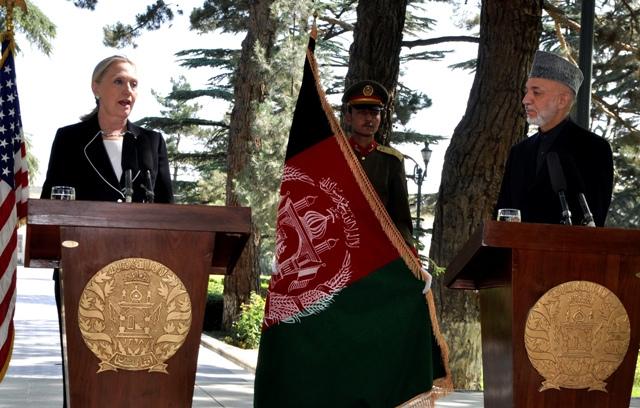KABUL ally (MNNA) under a strategic partnership deal signed between President Hamid Karzai and his American counterpart Barack Obama on May 2.
At a joint press conference with President Hamid Karzai after unannounced arrival in Kabul, Clinton said US President Barak Obama had designated Afghanistan as a major non-NATO ally in line with the strategic partnership agreement.
Following their meeting, Karzai and Clinton left for Japan to participate in Sunday’s Tokyo Conference, where billions of dollars would be pledged in aid for Afghanistan’s development after coalition troops leave the country in 2014.
Clinton promised they would not abandon the country after the end of the war on terror. “We can’t even think of leaving Afghanistan alone,” she said. Afghanistan’s security had improved and Afghan forces were getting better, she added.
Answering a question, Clinton said joint efforts were being made to eradicate corruption from Afghanistan, improve the administrative system and promote good governance and rule of law in the country.
Donor countries would try to get a strong commitment of accountability to ensure that ordinary Afghans benefitted from international assistances, she said. “We are well aware of (corruption) but this is an issue that the government and people of Afghanistan want action on.”
Welcoming Clinton, Karzai said the top US diplomat was in Kabul to firm up ties with Afghanistan. The non-NATO ally status reflected America’s long-term commitment to Afghanistan, he believed.
MNNA designation paves the way for enhanced defence cooperation between the two countries. With NATO-led troops preparing to pull out of the country by the end of 2014, the alliance paves the ground for Afghanistan’s accelerated ability to purchase US equipment and easier export control regulations.
The US has already designated 14 countries as major non-NATO allies, including Australia, Egypt, Israel, Jordan, Japan, Kuwait, Morocco, New Zealand, Pakistan, the Philippines, South Korea and Thailand. Pakistan was the last country to win the status eight years ago.
The announcement comes on the eve of the Tokyo Conference, where world leaders, including Clinton, will hold out new aid pledges for Afghanistan’s development after coalition troops leave the impoverished country.
In Washington, the State Department said after the entry into force of the Strategic Partnership Agreement on July 4, President Obama signed the MNNA designation for Afghanistan, the first nation to gain the status since 2004.
“MNNA designation provides a long-term framework for our security and defense cooperation. It reinforces the strong bilateral defense relationship between the United States and Afghanistan by helping support aligned defense planning, procurement and training.
“Only a limited number of countries have this special status. MNNA qualifies a country for certain privileges supporting defense and security cooperation but does not entail any security commitment to that country,” a statement from the State Department said.
Some of the privileges of the status include eligibility for training, loans of equipment for cooperative research and development, and ultimately foreign military financing for commercial leasing of certain defense articles.
“As Afghanistan takes on greater financial responsibility for its own security, MNNA status will be a critical catalyst for maintaining effective Afghan National Security Forces and building a robust peacetime security relationship between Afghanistan and the United States,” the statement added.
myn/vp/mud
Visits: 1









GET IN TOUCH
NEWSLETTER
SUGGEST A STORY
PAJHWOK MOBILE APP